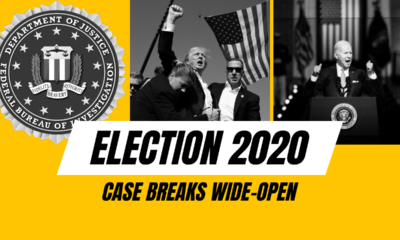Judicial
PayPal definitely goes woke
PayPal, after rescinding an earlier announced fine of $2500 for posting anti-woke content, reinstated the fine, as if no one would notice.
PayPal, on the night of October 26, quietly reinstated a veiled threat to fine users at least $2500 for misinformation. Or at least, misinformation as they define it.They had first announced that policy on September 26, then rescinded it on October 8. But the rescission seems to have been only temporary – and worse, PayPal seems not to have announced the reinstatement officially. Instead, if a user happens to view the User Agreement (specifically the part of it headlined “Restricted Activities and Holds”, they can see the language on fines appear once again. Under the circumstances, a user might reasonably decide, in the interest of safety, to find another payment processor.
What PayPal now says
Reportage on this on, off, and on-again policy comes from The Gateway Pundit. They reported the initial announcement, the apparent rescission, and then the apparent reinstatement. Readers can read PayPal’s User Agreement and the Acceptable User Policy (AUP), as it now stands and as it will stand on November 3, 2022. Given the extreme sensitivity and sensational nature of this news, all PayPal links appear courtesy of the Wayback Machine. In addition one can download the new Acceptable Use Policy as a PDF.
The key addition to the AUP concerns anti-woke content:
You may not use the PayPal service for activities that … involve the sending, posting, or publication of any messages, content, or materials that, in PayPal’s sole discretion,
(a) are harmful, obscene, harassing, or objectionable,
(b) depict or appear to depict nudity, sexual or other intimate activities,
(c) depict or promote illegal drug use,
(d) depict or promote violence, criminal activity, cruelty, or self-harm,
(e) depict, promote, or incite hatred or discrimination of protected groups or of individuals or groups based on protected characteristics (e.g. race, religion, gender or gender identity, sexual orientation, etc.)
(f) present a risk to user safety or well-being,
(g) are fraudulent, promote misinformation, or are unlawful,
(h) infringe the privacy, intellectual property rights, or other proprietary rights of any party, or
(i) are otherwise unfit for publication.
From the User Agreement
The User Agreement says in part:
In connection with your use of our websites, your PayPal account, the PayPal services, or in the course of your interactions with PayPal, other PayPal customers, or third parties, you must not:
Provide false, inaccurate or misleading information.
The fine threat appears in this paragraph of the User Agreement:
If you’ve violated our Acceptable Use Policy, then you’re also responsible for damages to PayPal caused by your violation of this policy; or
If you are a seller and receive funds for transactions that violate the Acceptable Use Policy, then in addition to being subject to the above actions you will be liable to PayPal for the amount of PayPal’s damages caused by your violation of the Acceptable Use Policy.
You acknowledge and agree that $2,500.00 U.S. dollars per violation of the Acceptable Use Policy is presently a reasonable minimum estimate of PayPal’s actual damages – including, but not limited to:
internal administrative costs incurred by PayPal to monitor and track violations,
damage to PayPal’s brand and reputation, and
penalties imposed upon PayPal by its business partners resulting from a user’s violation –
considering all currently existing circumstances, including the relationship of the sum to the range of harm to PayPal that reasonably could be anticipated because, due to the nature of the violations of the Acceptable Use Policy, actual damages would be impractical or extremely difficult to calculate.
PayPal may deduct such damages directly from any existing balance in any PayPal account you control.
Unpacking the threats
Technically, the fine threat applies to sellers, not buyers. But who is a seller? The Gateway Pundit and author Jim Hoft report that PayPal banned both from its platform at year’s end 2021. Evidently a journalist is a “seller” of his content. But what exactly are the damages to PayPal from a buyer’s activities? PayPal won’t say.
What interactions does PayPal presume to police, that are off their platform? The language of the User Agreement seems to imply that they have the authority to police everything you do or say, on or off PayPal. And what is a third party, with whom they presume to police your interactions?
Concerning the AUP, phrases (a), (e), and (g) create the worst problems. Absolutely anyone can “object” to anything, and claim a real or illusory “harm.” Phrase (i) (“are otherwise unfit…”) is a typical giant-economy-sized prohibition, ripe for abuse in itself. But phrases (b), (c), and (d) present problems of their own. Does selling a work of police procedural fiction constitute violative “depiction” of the illegal activities the story’s villains commit? What would PayPal say to a bookstore who carries, say, Earle Stanley Gardner’s Perry Mason novels? Or the potboiler fiction by Patricia Cornwall, James Patterson, and similar authors?
Hazards of the PayPal policy
Understand this: Conservative News and Views is not a law firm, and your editor is not a lawyer. Therefore CNAV cannot dispense legal advice. Instead, we will give a businessman’s advice.
Anyone who uses any sort of payment processing service, must understand the inherent risks of such a service. PayPal specifically acts as a bank, allowing users to hold balances. In addition, PayPal lets a user link bank, credit/debit card, and other accounts to his PayPal account. In that way, he can send or receive payment more easily than through direct deposit or withdrawal from his bank, direct charge or credit to a credit/debit account, and so on.
But now this particular payment processor presumes to tell a user what he may or may not say. “Misinformation” has become a matter of opinion. On-line security specialists have told CNAV that PayPal has no reasonable authority whatsoever to fine people any amount of money, without first taking legal action and thus bringing the matter before a court of law. By even threatening to lay such a fine, PayPal has made itself unreliable and unsafe. The risk of losing $2500, or more, without warning or explanation, might strike most people as unreasonable. No convenience would be worth that risk.
Reactions
Two former PayPal officers and investors, David Marcus and Elon Musk, condemned the policy change when PayPal first announced it. “Insanity!” cried Marcus – and Elon Musk agreed with him.
At once several commentators urged people to close their PayPal accounts. Then some users reported that PayPal was blocking such closures.
That’s when PayPal “rescinded” the policy and offered $15 “vouchers” if people would decide not to close their accounts. Users were having none of it.
Do not take their $15 bribe. Delete your PayPal account.
Originally tweeted by Ian Miles Cheong (@stillgray) on October 13, 2022.
The apparent blockage could have resulted from millions of users closing their accounts at once. Your editor closed several accounts, without incident – and without PayPal offering any bribe to stay, either.
Alternatives
But what can one do instead? Obviously one can still pay good old-fashioned cash for things, or use a credit or debit card directly. One can even buy a one-off credit card – use it once, then never use it again. Cryptocurrency also becomes a viable alternative – if not for investment (users might find it too volatile for that), then as another medium of exchange.
In addition, Andrew Torba has moved forward to add payment processing to his Gab Empire, after PayPal disallowed him. Gab Pay is now available in the United States, and shortly will be available in 110 other countries. At present it can handle personal transactions up to $7000 a week, or business transactions up to $25,000. See Gab Pay for details, and advice on how to apply for an account. (Gab Pay does not sponsor CNAV in any way.) They have an Acceptable Use Policy as well, but it is much simpler. And it does not set limits on what you say, on or off the platform.
PayPal has now damaged its brand irreparably, by creating confusion and engaging in what a lawyer might call bait-and-switch. It thus joins a long line of companies that:
- Cornered their respective markets, then
- Presumed to police the speech and lawful activities of their users.
This forms the basis of the Parallel Marketplace that Andrew Torba, Dr. Steve Turley, and others have long advocated.
Terry A. Hurlbut has been a student of politics, philosophy, and science for more than 35 years. He is a graduate of Yale College and has served as a physician-level laboratory administrator in a 250-bed community hospital. He also is a serious student of the Bible, is conversant in its two primary original languages, and has followed the creation-science movement closely since 1993.
-

 Accountability4 days ago
Accountability4 days agoWaste of the Day: Principal Bought Lobster with School Funds
-

 Civilization1 day ago
Civilization1 day agoWhy Europe Shouldn’t Be Upset at Trump’s Venezuelan Actions
-

 Executive2 days ago
Executive2 days agoHow Relaxed COVID-Era Rules Fueled Minnesota’s Biggest Scam
-

 Constitution3 days ago
Constitution3 days agoTrump, Canada, and the Constitutional Problem Beneath the Bridge
-

 Christianity Today1 day ago
Christianity Today1 day agoSurprising Revival: Gen Z Men & Highly Educated Lead Return to Religion
-

 Civilization2 days ago
Civilization2 days agoThe End of Purple States and Competitive Districts
-

 Executive2 days ago
Executive2 days agoWaste of the Day: Can You Hear Me Now?
-

 Civilization5 days ago
Civilization5 days agoThe Conundrum of President Donald J. Trump














